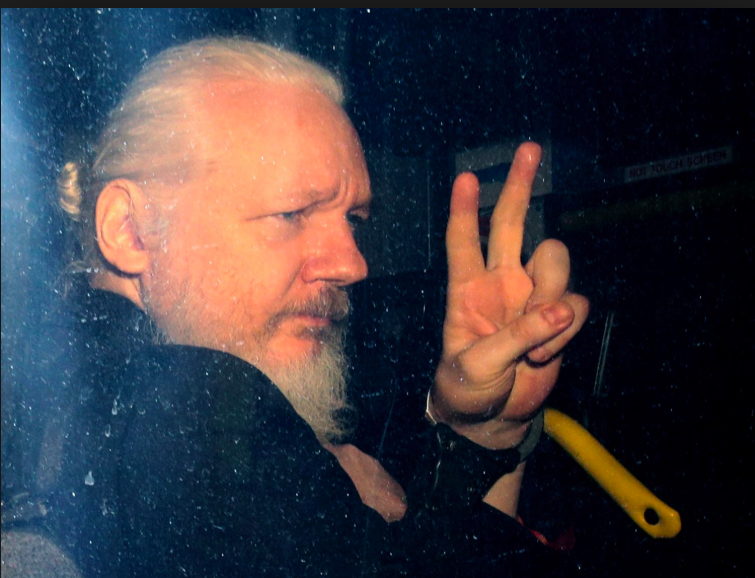British goon cops acting at the request of the United States government entered Ecuador’s embassy in London and dragged out WikiLeaks founder Julian Assange, preparing to ship him across the pond.
After this event last month most of the mainstream media reacted with spiteful glee about Assange’s predicament and relief that the Department of Justice had exercised self-restraint in its choice of charges.
“Because traditional journalistic activity does not extend to helping a source break a code to gain illicit access to a classified network, the charge appeared to be an attempt by prosecutors to sidestep the potential First Amendment minefield of treating the act of publishing information as a crime,” reported The New York Times.

At the time, the feds had accused Assange of hacking conspiracy because he and Army whistleblower Chelsea Manning allegedly discussed how to break into a Pentagon computer.
Bob Garfield of NPR’s “On the Media,” a veteran reporter who should and probably does know better, was one of many establishmentarians who opined that we needn’t worry because Assange isn’t a “real” journalist.
This being the Trump Administration, self-restraint was in short supply. It turns out that the short list of Assange charges was a temporary ploy to manipulate our gullible English allies. Now Assange faces 17 additional charges under the Espionage Act and a finally-concerned Times calls it “a novel case that raises profound First Amendment issues” and “a case that could open the door to criminalizing activities that are crucial to American investigative journalists who write about national security matters.”
Corporate media’s instant reversal on Assange—from rapist scum to First Amendment hero within minutes—elevates self-serving hypocrisy to high art. But that’s OK. Whatever gets Assange closer to freedom is welcome—even the jackals of corporate media.
May we linger, however, on an important point that risks getting lost?
Even if Assange were guilty of hacking into that Pentagon computer…
Even if it had been Assange’s idea…
Even if Manning had had nothing to do with it…
Even if Trump’s DOJ hadn’t larded on the Espionage Act stuff…
Assange should not have faced any charges.
Included in the material Manning stole from the military and posted to WikiLeaks were the “Afghan War Logs,” the “Iraq War Logs,” files about the concentration camp at Guantánamo and the “Collateral Murder” video of the U.S. military’s 2007 massacre of civilians in Baghdad.
For the sake of argument let’s assume that Assange, without Manning, had personally hacked into a Pentagon computer and in doing so discovered proof that U.S. occupation forces in Iraq and Afghanistan were guilty of war crimes, including torture and the mass murder of civilians for fun—and put that evidence of criminal wrongdoing online.
Would Assange deserve a prison term? Of course not. He would merit a medal, a ticker-tape parade, a centrally-located handsome statue or two.
Even if Assange were “guilty” of the hacking charges, so what? The “crime” of which he stands accused pales next to the wrongdoing he helped to expose.
Good Samaritan laws protect people who commit what the law calls a “crime of necessity.” If you save a child from your neighbor’s burning house the police shouldn’t charge you with trespassing. Similarly if the only way to expose government or corporate lawbreaking is to steal confidential documents and release them to the press à la Edward Snowden, you should be immune from prosecution. That principle clearly applies to the materials Manning stole and Assange released as a public service to citizens unaware of the misdeeds committed under their name and at their expense.
Even among liberals it has become fashionable to observe that people who engage in civil disobedience must be prepared to face legal punishment. This is a belief grounded in practicality: individuals who confront the state need to understand that theirs will be a difficult struggle.
Over the past few decades, however, what was common sense has become perverted into a bizarre justification for oppression: Snowden/Assaange/Manning/Winner violated laws, they knew what they were doing, that’s the risk they took, and so—this is the weird part—the Left need not defend them.
Yes, these whistleblowers knew (or ought to have known) that they risked prosecution and prison time. But that’s the way things are, not the way they ought to be.
The project of a Left must be to fight for society and politics as they should be, not to blandly shrug our shoulders and accept the status quo. Laws should be rewritten to protect whistleblowers like Manning and journalists like Assange who expose official criminality.
Whistleblowers should never face prosecution.
For aNewDomain, I’m Ted Rall.













